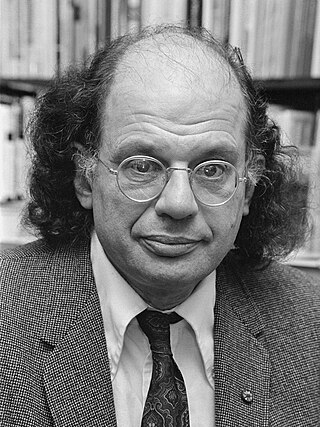
Irwin Allen Ginsberg was an American poet and writer. As a student at Columbia University in the 1940s, he began friendships with Lucien Carr, William S. Burroughs and Jack Kerouac, forming the core of the Beat Generation. He vigorously opposed militarism, economic materialism, and sexual repression, and he embodied various aspects of this counterculture with his views on drugs, sex, multiculturalism, hostility to bureaucracy, and openness to Eastern religions.

The Beat Generation was a literary subculture movement started by a group of authors whose work explored and influenced American culture and politics in the post-World War II era. The bulk of their work was published and popularized by Silent Generationers in the 1950s, better known as Beatniks. The central elements of Beat culture are the rejection of standard narrative values, making a spiritual quest, the exploration of American and Eastern religions, the rejection of economic materialism, explicit portrayals of the human condition, experimentation with psychedelic drugs, and sexual liberation and exploration.
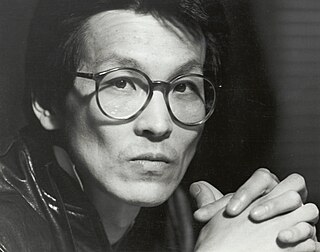
Wayne Wang is a Hong Kong–born American director, producer, and screenwriter. Considered a pioneer of Asian-American cinema, he was one of the first Chinese-American filmmakers to gain a major foothold in Hollywood. His films, often independently produced, deal with issues of contemporary Asian-American culture and domestic life.

Diamanda Galás is an American musician, singer-songwriter, and visual artist. She has campaigned for AIDS education and the rights of the infected.

Charles Arthur Russell Jr. was an American cellist, composer, producer, singer, and musician from Iowa, whose work spanned a disparate range of styles. After studying contemporary composition and Indian classical music in California, Russell relocated to New York City in the mid-1970s, where he became involved with both Lower Manhattan's avant-garde community and the city's burgeoning disco scene. His eclectic music was often marked by adventurous production choices and his distinctive voice.
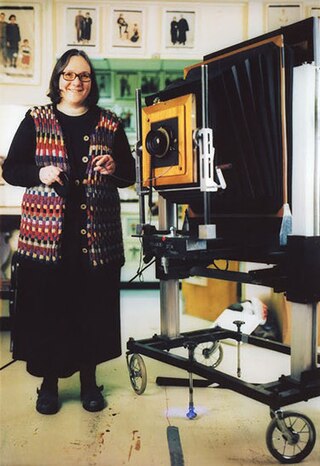
Elsa B. Dorfman was an American portrait photographer. She worked in Cambridge, Massachusetts, and was known for her use of a large-format instant Polaroid camera.

Charles Plymell is a poet, novelist, and small press publisher. Plymell has been published widely, collaborated with, and published many poets, writers, and artists, including principals of the Beat Generation.
Carolyn Elizabeth Robinson Cassady was an American writer and associated with the Beat Generation through her marriage to Neal Cassady and her friendships with Jack Kerouac, Allen Ginsberg, and other prominent Beat figures. She became a frequent character in the works of Jack Kerouac.

Jonestown: The Life and Death of Peoples Temple, is a 2006 documentary film made by Firelight Media, produced and directed by Stanley Nelson. The documentary reveals new footage of the incidents surrounding the Peoples Temple and its leader Jim Jones who led over 900 members of his religious group to a settlement in Guyana called Jonestown, where he orchestrated a mass suicide with poisoned Flavor Aid, in November 1978. It is in the form of a narrative with interviews with former Temple members, Jonestown survivors, and people who knew Jones.

Peter Zummo is an American composer and trombonist. He has been described as "an important exponent of the American contemporary classical tradition." Meanwhile, he has been quoted as describing his own work as "minimalism and a whole lot more."
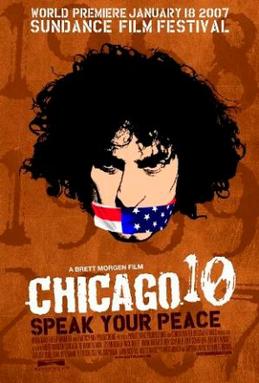
Chicago 10: Speak Your Peace is a 2007 American animated documentary written and directed by Brett Morgen that tells the story of the Chicago Eight. The Chicago Eight were charged by the United States federal government with conspiracy, crossing state lines with intent to incite a riot, and other charges related to anti-Vietnam War and countercultural protests in Chicago, Illinois during the 1968 Democratic National Convention.
The Life and Times of Allen Ginsberg is a 1993 film by Jerry Aronson chronicling the poet Allen Ginsberg's life from his birth and early childhood to his thoughts about death at the age of 66. The film has been completed and released a number of times due to changing technologies and world events. The first release of the film was in 1993 at the Sundance Film Festival after which it enjoyed an international festival run and USA theatrical run. At the time, Ginsberg was still alive. When Aronson showed him the film the poet is reported to have nodded his head thoughtfully and said, "So, that's Allen Ginsberg."

Arthur J. Bressan Jr. was an American director, writer, producer, documentarian and gay pornographer, best known for pioneering independent queer cinema in the United States during the 1970s and 1980s. He wrote and directed the 1985 feature film Buddies, which was the first American film to grapple with the subject of the AIDS pandemic. Other directorial endeavors include the largely influential 1977 documentary Gay USA, and the 1983 feature film Abuse. He died on July 29, 1987, at the age of 44 due to an AIDS-related illness.
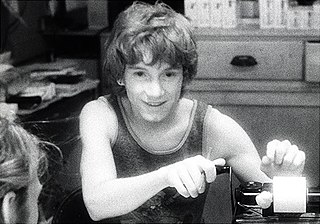
Daniel Nicoletta is an Italian-American photographer, photojournalist and gay rights activist.

Howl is a 2010 American film which explores both the 1955 Six Gallery debut and the 1957 obscenity trial of 20th-century American poet Allen Ginsberg's noted poem "Howl". The film is written and directed by Rob Epstein and Jeffrey Friedman and stars James Franco as Ginsberg.
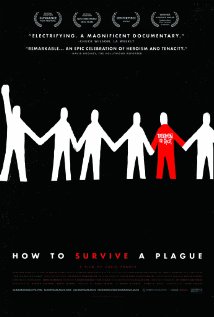
How to Survive a Plague is a 2012 American documentary film about the early years of the AIDS epidemic, and the efforts of activist groups ACT UP and TAG. It was directed by David France, a journalist who covered AIDS from its beginnings. France's first film, it was dedicated to his partner Doug Gould who died of AIDS-related pneumonia in 1992. The documentary was produced using more than 700 hours of archived footage which included news coverage, interviews as well as film of demonstrations, meetings and conferences taken by ACT UP members themselves. France says they knew what they were doing was historic, and that many of them would die. The film opened in selected theatres across the United States on September 21, 2012, also includes footage of a demonstration during mass at St. Patrick's Cathedral in 1989.

Matt Wolf is an American filmmaker, documentarian, and producer. His notable films include Wild Combination: A Portrait of Arthur Russell, Teenage, Bayard & Me,Recorder: The Marion Stokes Project, and Spaceship Earth. In 2010, he was awarded a Guggenheim fellowship. His subjects include youth culture, artists, archives, music, and queer history.
The Continuing Story of Carel and Ferd is a video directed by Arthur Ginsberg and Video Free America involving footage filmed between 1970 and 1975 following the lives and marriage of Carel Rowe and Ferd Eggan. Originally shown as a 3- channel video, 8-monitor installation including live feed of the audience for The Kitchen in New York in 1971, the edited video is now distributed by Video Data Bank and Electronic Arts Intermix. The edited video consists of an hour-long tape selected from over 30 hours of footage that includes both footage of the marriage and subsequent consummation, shot from 1971-1972, and footage of an interview of Carel, Ferd, and Ginsberg produced for WNET's Video and Television Review in 1975. The video is most readily available as a 33:15 segment on a collection of videos and video segments produced by Video Data Bank, Surveying the First Decade: Volume One: Program 3: Approaching Narrative: "There are Problems to be Solved".The Continuing Story of Carel and Ferd is often classified as video vérité, somewhere in between cinéma vérité and reality television, though the footage predates An American Family, a documentary series often considered the first example of reality television.
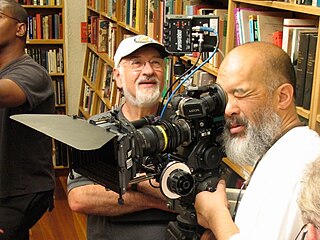
Robert N. Zagone is an independent filmmaker and television director who is best known for his independent feature films Read You Like a Book and The Stand-In. He is also well known for the iconic guerilla-style documentary Drugs in the Tenderloin, as well as many film recordings of the musical culture of San Francisco, including Go Ride the Music, featuring Jefferson Airplane and Quicksilver Messenger Service; A Night at the Family Dog, featuring the Grateful Dead, Santana, and Jefferson Airplane; Big Brother and the Holding Company with Janis Joplin; and the infamous Bob Dylan Press Conference. Zagone was one of the first filmmakers to cover the cultural explosion of the 1960s in the San Francisco Bay Area.
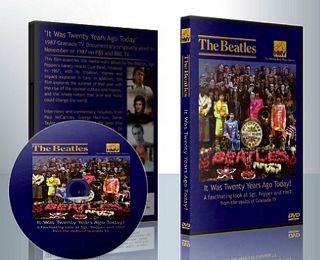
It Was Twenty Years Ago Today is a 1987 British-made television documentary film about the 1967 Summer of Love. It premiered on 1 June 1987, twenty years after the official release date of the Beatles' album Sgt. Pepper's Lonely Hearts Club Band, and presents the album as the central factor behind the events and scenes that led to the full emergence of the 1960s counterculture.

















